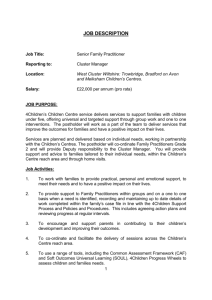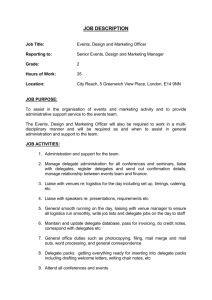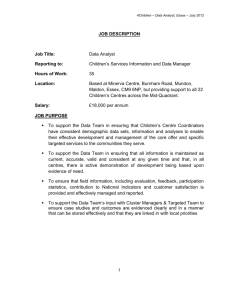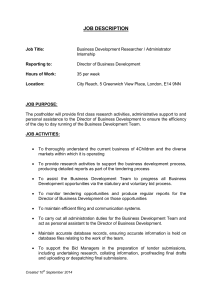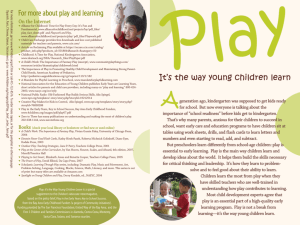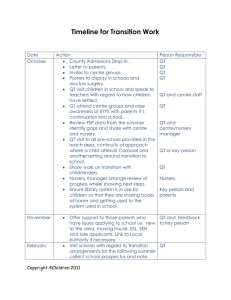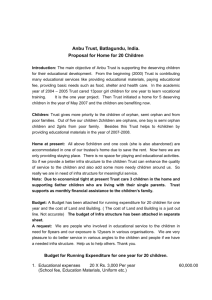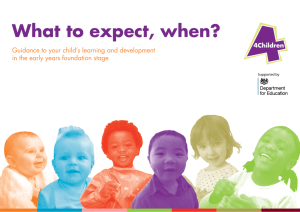Positive for youth
advertisement
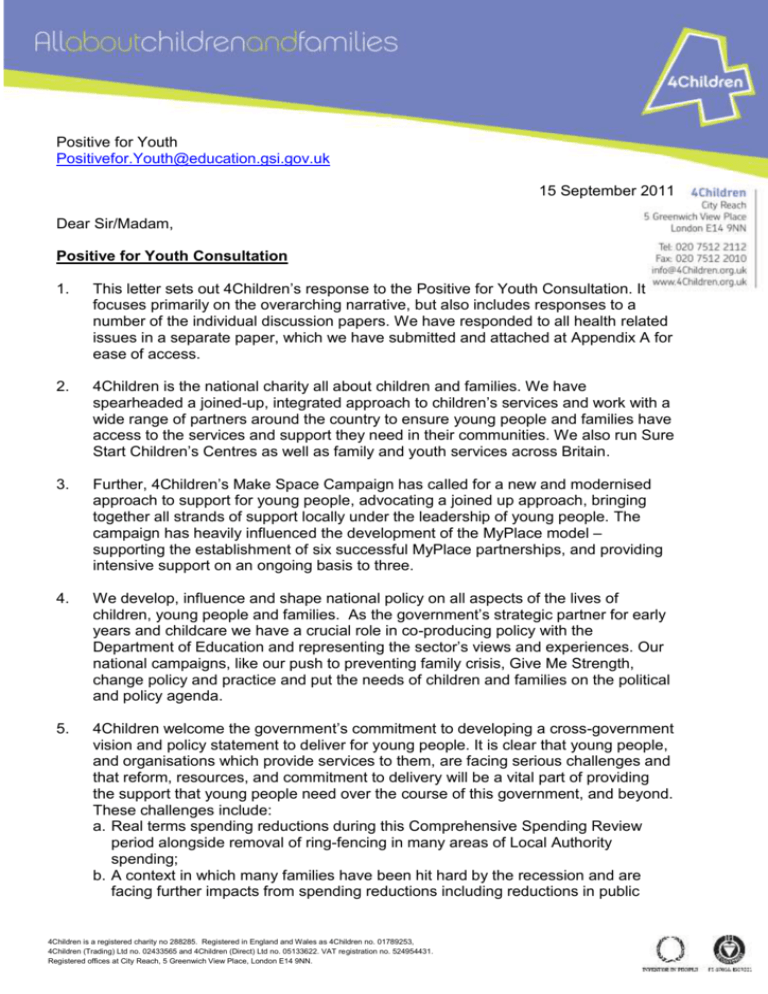
Positive for Youth Positivefor.Youth@education.gsi.gov.uk 15 September 2011 Dear Sir/Madam, Positive for Youth Consultation 1. This letter sets out 4Children’s response to the Positive for Youth Consultation. It focuses primarily on the overarching narrative, but also includes responses to a number of the individual discussion papers. We have responded to all health related issues in a separate paper, which we have submitted and attached at Appendix A for ease of access. 2. 4Children is the national charity all about children and families. We have spearheaded a joined-up, integrated approach to children’s services and work with a wide range of partners around the country to ensure young people and families have access to the services and support they need in their communities. We also run Sure Start Children’s Centres as well as family and youth services across Britain. 3. Further, 4Children’s Make Space Campaign has called for a new and modernised approach to support for young people, advocating a joined up approach, bringing together all strands of support locally under the leadership of young people. The campaign has heavily influenced the development of the MyPlace model – supporting the establishment of six successful MyPlace partnerships, and providing intensive support on an ongoing basis to three. 4. We develop, influence and shape national policy on all aspects of the lives of children, young people and families. As the government’s strategic partner for early years and childcare we have a crucial role in co-producing policy with the Department of Education and representing the sector’s views and experiences. Our national campaigns, like our push to preventing family crisis, Give Me Strength, change policy and practice and put the needs of children and families on the political and policy agenda. 5. 4Children welcome the government’s commitment to developing a cross-government vision and policy statement to deliver for young people. It is clear that young people, and organisations which provide services to them, are facing serious challenges and that reform, resources, and commitment to delivery will be a vital part of providing the support that young people need over the course of this government, and beyond. These challenges include: a. Real terms spending reductions during this Comprehensive Spending Review period alongside removal of ring-fencing in many areas of Local Authority spending; b. A context in which many families have been hit hard by the recession and are facing further impacts from spending reductions including reductions in public 4Children is a registered charity no 288285. Registered in England and Wales as 4Children no. 01789253, 4Children (Trading) Ltd no. 02433565 and 4Children (Direct) Ltd no. 05133622. VAT registration no. 524954431. Registered offices at City Reach, 5 Greenwich View Place, London E14 9NN. c. d. e. f. 6. sector jobs and potential reductions in public service provision. This is leading to a renewed debate about how best to support children and families through tough times; Young people are facing particular challenges as a result of economic situation with youth unemployment high and growing competition for university places, apprenticeships and first jobs; Unacceptable levels of young people’s involvement in risky behaviour, anti-social behaviour and crime, culminating in the recent nationwide riots; Growing levels of childhood obesity, and parental concern for young people’s safety; and A public debate questioning the role and affordability of universal services and the role of prevention and early intervention as a basis for services. We submit our response to this consultation with the hope that a strong, coherent vision will help young people and youth services to learn and grow from these challenges, rather than be undermined and disadvantaged by them. Summary of Recommendations 7. The following recommendations highlight the key issues we focus on in this response. The government must: Work with local authorities and voluntary sector partners to develop an integrated approach to delivering youth services, such as 4Children’s Community Partnership Model; Intervene early to prevent problems developing with intensive support, and turnaround young people and families when troubles do occur; Ensure that youth services form part of an integrated approach to supporting children and young people, to ensure their problems are addressed, and their aspirations enabled; and Implement the ‘Family Test’ in a real and meaningful way, to ensure that government policy supports and strengthens family life – providing vital resilience to children and young people. Early Intervention 8. 4Children welcomes the recognition of the benefits of early intervention set out in the ‘positive for youth’ document, and across government more generally. Early intervention is not just about the early years of life. Providing information, advice and support before problems become crises is just as important for young people and their families as it is for under-5s. It sometimes seems that policy and service delivery seeks to tackle challenges faced by young people such as NEET status, teen pregnancy or poor self-esteem and well-being as if they simply ‘appear’ as problems in later childhood. Clearly this is not the case. 9. We need to take a much more preventative approach which recognizes that successful transition through the ages and stages of childhood is the key to being able to fulfil your ambitions and potential during teens and early adulthood. 10. We know a great deal about risk factors in predicting problem behaviour and crime from longitudinal studies carried out in the United States and in England (e.g.1). For example, we now know that the most important individual risk factors that predict offending are: low intelligence, low attainment, personality and temperament, empathy and impulsiveness. 11. These individual risk factors are accompanied by strong family risks, including: criminal and anti-social parents; large family size; poor parental supervision; parental conflict; disrupted families, and important environmental risk factors include low socio-economic households associated with ‘delinquent’ friends, attending ‘highdelinquency’ schools and living in deprived areas2. 12. But just as there are risk factors (and multiple risk factors) that increase the likelihood of problem teenage behaviour, so there are factors that mitigate or buffer the impact of risks - even when children and young people are heavily exposed to these risks. This is why some children from deprived backgrounds can be exposed to a cluster of risk factors and not grow up with problem behaviour and underachieve in schools, whilst others (without the ‘protective’ factors) do grow up this way. 13. Some of these ‘protective’ factors, such as personal characteristics, are beyond the control of governments, local authorities, and policy makers, but other protective factors can significantly help in moderating some of the aggregate risks that young people are exposed to (see Box 1). Box 1: Protective factors linked to positive outcomes • • • • • • • Strong bonds with family, friends and teachers Healthy standards set by parents, teachers and Community leaders Opportunities for involvement in families, schools and the community Social and learning skills to enable participation Recognition and praise for positive behaviour 14. The evidence around family-based risk factors clearly point to early (effective) familybased interventions to prevent poor behaviour, delinquency and crime. Interventions that focus on strong (authoritative and consistent) parenting to control poor behaviour, warm and supportive parents and relationship-skills (between parents) are likely to go a significant way to help moderate the negative effects of other risk factors amongst children (e.g. low family income; poor housing etc.). 15. Consequently, central government and local authorities must make good on their commitments to early intervention, and to direct funding towards projects, The Cambridge Study in Delinquent Development and the Pittsburgh Youth Study: The Cambridge Study in Delinquent Development is a longitudinal survey of 400 London males from age 8 to 48. Males were interviewed and assessed nine times between the age of 8 and 48, and were originally assessed in 1961-2 (see Farrington, 2003). The Pittsburgh Youth Study is a longitudinal survey of 1,500 Pittsburgh males from ages 7, 10 and 13 (see Loeber et al, 2003). 2 Jolliffe and Farrington, 2004; Farrington and Walsh, 2007). 1 programmes, and interventions, which prevent problems, rather than merely treating their symptoms. 16. The Government and local authorities must also ensure that they prioritises early intervention for young people at times of increased vulnerability to risk. This means intensive support during the transition period between primary to secondary school, and targeted support when young people face family crises. Youth Sector Reform 17. In order to really deliver for young people, serious reform to youth provision must be undertaken. Youth facing services across the country have remained largely unchanged over several decades, and access to high quality, inspirational activities is limited in many areas; with not enough access to preventative support for those that are at risk; and services that operate in silos from other youth and family support. 18. However, in a number of key policy areas, there have been significant recent reforms which can act as a blue-print and a point of comparison for the Youth Sector. 19. For example, the Early Years and Childcare sector has undergone significant reform and reshaping, and emerged substantially stronger. As a result it is well placed to provide a model, and point of comparison, for revitalising the youth sector – particularly given its embrace of early intervention methodology, and the long term improvements it is delivering to children’s lives. Some key learning points include: a. Highlighting the importance of working across professional boundaries to give integrated help and support; b. Making the most of the capital investment programme and bringing more services into coordinated hubs and centres; c. Recognizing the role of volunteers, peer mentors and the wider community; and d. Being clear about outcomes and what really makes the difference to communities and to narrowing the gap for individuals. 20. Lessons can also be taken from the government’s approach to supporting the 120,000 most troubled families in the UK. A wealth of evidence3 clearly sets out that when services are delivered in silos, without a holistic approach to resolving problems, the results they can achieve are significantly worsened and creating firm foundations for people’s lives becomes more difficult. 21. This means that targeted services for young people must recognise the central role of the family context and work across professional silos to deliver impactful turnaround programmes for troubled teenagers. Community Partnerships and Young People 22. Models of successful, wrap around support for Youth Services, such as Community Partnerships – being pioneered by 4Children, offer a new approach to joined-up services for children 0 – 19 and their families. They offer early and intensive 3 http://www.involve.org.uk/turning-around-public-services/ intervention and support when it is needed through joined up, community based services in and around children’s centres, schools and MyPlace. 23. 4Children has consulted 10,000 families and over 16,000 young people over recent years. Overwhelmingly they have told us: That the problems families and young people face are complex and multidimensional; That current solutions tend to be silo based and disjointed; That solutions need to take a holistic family approach; and That solutions need integrated working. 24. Families have also told us4: That even the most troubled families underneath the harsh veneer have the same ambitions as all of us; That they are often very resilient; That they have the capacity to cope; and That with the right kind of support they are capable of overcoming their problems; That family problems often get out of hand when young people enter the teenage years 25. Troubled young people5 have also expressed their frustration with the support and opportunities on offer. They have told us: That their expectations and ambitions for the future were high when they were younger but fell drastically with the teenager years as opportunities closed down; That troubles often develop from 12 – 15 and can then get out of control; That services are disjointed and do not help them break out of their problems; That their parents do not always have the capacity to help them flourish; and That communities are important and can help provide positive role models. 26. 4Children is therefore advocating a new approach of Community Partnerships to address these issues by providing joined up support and opportunities to help young people and their families flourish (set out in diagram 1, below). Working intensively with the whole family and community, this three pronged approach will deliver and co-ordinate support for young people and families which is capable of identifying problems early and turning around difficulties when they do exist. 4 5 The Family Commission Report, 2010 Make Space Youth Review, 2007 and Knowsley Youth Commission Report, 2008 27. The Community Partnership includes: Universal services – these are services which will be available to all parts of the community through children’s centres, schools and traditional youth-based activities. With strong participation, role models and volunteering at the centre, these services will encourage and work with wider community based provision and peer to peer groups. The role of the local authority in providing these services would be restricted to facilitation, support and quality assurance rather than delivering provision; Early intervention – as well as strong early years provision, this would also include parenting support (particularly for parents of vulnerable teenagers), strong partnership with health, and access to specialist support. Strong support and identification around schools and youth provision is crucial – especially in the transition from primary to secondary school; and Intensive support – for those families and young people with more complex needs the model would provide intensive support and turnaround – delivered on a one to one basis in the home and through the community based provision. This would include intensive personal development with young people, practical help and problem solving with parents as well as long term support for issues such as mental health and domestic violence. Importantly young people and families have the ongoing support of community based and run services to revert to once they move on from intensive support. 28. The integrated approach we are advocating maximises the potential of existing provision to create a community hub and springboard for all young people and families to get the support they need, when they need it – pre birth and throughout childhood. 29. Our Essex centre, Carousel, sets out a vision of how Sure Start services could be expanded to deliver for the entire community, and ensure that family problems can be dealt with before they become crises. Case study: Carousel Children’s Centre – a Centre providing support to families with children 0-19 years 4Children’s Carousel Children’s Centre is run in partnership with Essex County Council. Opened in May 2006 the flagship centre pioneered the 4Children approach to fully integrated service provision and facilities for children aged 0-19 and their families. As well as providing a high quality ‘core offer’, Carousel has taken the concept a step further, now providing over 40 different services. As well as activities for younger children, including a static bus within the grounds to encourage free play for under 5 year olds, the centre also hosts a play strategy club for 11-14 year olds which runs daily after school, and a youth club for 11-19 year olds. The centre attracts many teenagers who take part in social, volunteering and vocational opportunities and runs an alternative education programme for children likely to be excluded from school in yr 11 (aged16) alongside a complimentary education programme for children likely to be excluded in yr 9 (aged 14). Carousel is used as a resource base for families who have fostered or adopted children to support parents and bring children who have been fostered or adopted together in a relaxed setting. Inclusion Carousel is located in an area of acute deprivation with issues around teenage parenting, worklessness and child poverty. A successful relationship has the local traveller population and recent Polish immigrants who have experienced basic problems around integration. A full time Special Education Needs Officer works to ensure access to out of school provision for disabled children and their families at the centre. While Essex Police work in partnership with the centre to ensure that young people have access to youth support and provision at the centre. Early Intervention and Outreach Professional teams working to support early intervention work around schools, children & communities (TASCC) were created in September 2007 by Essex County Council. One of these teams is based at the Carousel Children’s Centre and works in the community to intervene early to support families in difficulty. The Centre has Family Outreach Workers to work with vulnerable and hard to reach families at the earliest stage possible to deal with family or parenting difficulties before they are escalated to TASCC. MyPlace 30. The existing MyPlace infrastructure also offers an excellent opportunity for the government to deliver on its positive vision for young people. The £200m capital project delivered a range of state of the art centres across the country – the centres were enthusiastically welcomed by local communities and strongly supported by both the voluntary sector and local authorities, and were an excellent example of community cooperation, and government action. 31. These centres have much to offer young people in terms of: integrated services; leisure and community building; early intervention support; and much more to ensure that young people and families are given space to grow and develop, and are given the opportunity to resolve their dramas before they become crises. 32. They also offer an excellent opportunity to improve youth health, by ensuring that young people are involved in the decisions that affect them, and are able to communicate directly with councils’ Health and Wellbeing boards – a strategy which would deliver dramatic results if replicated in all areas of youth and family provision. 33. Myplace centres have the potential to provide positive leadership and support for wider centres in the area, forming strong community hubs which act as springboards for wider action. [For further information about 4Children’s views on young people’s health see Appendix A]. Diversity and Media Representations 34. 4Children are happy to note the explicit references to the diversity of young people, in the consultation document. It is important to remember that young people are as varied and diverse as adults, and that media and public portrayals of young people often amount to little more than crude stereotypes. 35. We would recommend the government take a more proactive approach to acknowledging the diversity between and among young people – and steer clear of unhelpful references to ‘feral youths’6, ‘hoodies’7 or ‘the workshy’8 which contribute to the misrepresentation of young people in broader society. 36. ‘Positive for Youth’ is right to highlight young people’s feelings that the media portray them as ‘drug taking antisocial criminals’ and ‘sexually promiscuous fashionistas’, and to acknowledge the alienating and damaging effect this has on young people and their communities today. Instead of acquiescing to the whims of a hostile and discriminatory media, government must take a firm stand to recognise the positive contributions young people make to society, and challenge negative depictions of young people en masse wherever they arise. 37. An inclusive understanding of young people that recognises equal value in the activities they choose to pursue is essential to being ‘positive for youth’. In these troubled times, we must work together to ensure that services are responsive to 6 http://www.guardian.co.uk/commentisfree/2011/sep/05/punishment-rioters-help 7http://www.conservatives.com/News/Speeches/2007/08/David_Cameron_Youth_crime_and_measures _to_reduce_it.aspx 8 http://www.dailymail.co.uk/news/article-1218133/Benefits-slashed-work-shy-Tories-declare-war5m-worked-Labour.html young people’s needs, and in touch with what they want, rather than based on an inaccurate and outdated idea of appropriate services. A recent consultation of young people9 found that: a. Less than 25% felt they had a significant say over services and activities aimed at them; b. 45% said they were confused about where to go for support; and c. 79% said they would be more likely to access a ‘one stop shop’ for support services than if those services existed in different places. 38. 4Children would like to see a greater requirement placed upon local authorities, government departments, and the voluntary and commercial sector, to consult with young people to ensure public services are meeting their needs and supporting their aspirations. Credence should also be given to the views young people have already expressed10, and action taken to address their concerns around lack of support, discrimination and negative stereotyping of the young, and information and ease of access around services aimed at young people. 39. The challenge of being truly ‘positive for youth’ must be considered in light of the significant cuts to youth services across the country11, and declining economic prospects for the country as a whole12. 4Children supports the introduction of the Early Intervention Grant but believes it should be ring-fenced to ensure sufficient resources are being spent on children and family services. We also believe the Early Intervention Grant must increase in future years. 40. ‘Positive for Youth’ also draws attention to the achievement gaps between different groups of young people – between young men and women, and between young people from different ethnic and social backgrounds. These figures demonstrate that without a strong commitment, and real investment, in supporting those young people who really need it, whole communities may miss out on meeting their aspirations, and end up trapped in poverty, and in need of further, more expensive, support. 41. 4Children welcomes the introduction of the ‘Family Test’13 – indeed we called for such a test in the 2010 Family Commission Report. We believe that, if properly applied, this test can have a significant, positive impact over time. Research demonstrates, and families tell us, that what is good for families is good for young people, and so improving the lot of families can be a significant contribution to improving life chances for all children and young people. Conclusion 42. In conclusion, 4Children is very happy to welcome the government’s commitment to being ‘positive for youth’, and is happy to see the constructive approach to reform that it has taken in the consultation document. 9 http://www.makespace.org.uk/activities/make-space-youth-review http://www.jrf.org.uk/publications/young-peoples-views-and-experiences-growing 11 http://www.cypnow.co.uk/Youth_Work/article/1085555/youth-services-slashed-riot-hit-areas/ 12 http://www.guardian.co.uk/business/2011/sep/05/double-dip-recession-fears-49bn-shares 13 http://www.relationshipsfoundation.org/Web/News/News.aspx?News=127 10 43. This commitment, in alignment with its appreciation of the benefits of early intervention, and the important lessons on offer from other areas of government work – including the early years sector, and the work undertaken by Emma Harrison14, stands an excellent chance, if the right lessons are learned, of revolutionising support for young people in Britain. 44. 4Children believes that there is a real opportunity to reshape the support and narratives around young people in this country, and urges government and local authorities to be bold in their ambitions to reconfigure what we are able to offer. 45. Thank you for the opportunity to contribute to this consultation, if you would like any further information about our evidence please feel free to contact our Director of Public Affairs, Claire McCarthy, on 0207 522 6949 or Claire.McCarthy@4Children.org.uk. 46. 4Children would also like to offer any further support the government’s needs in developing this policy, and would highlight our expertise and experience in delivering successful support to young people. 14 http://www.workingfamilieseverywhere.com/ 4Children Consultation Response: Positive for Youth: Young People’s Health and Wellbeing Discussion Paper July 2011 4Children 1. This letter sets out 4Children’s response to the Positive for Youth: Young People’s Health and Wellbeing Discussion Paper. We have also submitted this paper as an appendix to our general response to the Positive for Youth consultation. 2. 4Children is the national charity all about children and families. We have spearheaded a joined-up, integrated approach to children’s services and work with a wide range of partners around the country to ensure children, young people and families have access to the services and support they need in their communities. We run Sure Start Children’s Centres as well as family and youth services across Britain. 3. We develop, influence and shape national policy on all aspects of the lives of children, young people and families. 4Children has extensive experience of working with young people: supporting them to become part of national policy groups and conferences, share best practice, inform commissions and join networks and campaigns. As well as our national Make Space youth health campaign, launched in 2008, 4Children also provides structured, innovative youth activities across 28 RAF bases in Britain to support children and young people from RAF communities to reach their full potential. 4. 4Children has supported 6 successful MyPlace partnerships and provides intensive support to three partnerships. Our role is to support partnerships across public and voluntary sector to ensure sustainable MyPlace centres. Our involvement over the last 3 years has given us a detailed insight into the changing needs of the centres due to social and economic changes and the need to think innovatively about long term sustainability. 5. 4Children’s Chief Executive, Anne Longfield, is a member of Minister for Children and Young People, Tim Loughton MP’s group of critical friends, tasked with advising on and helping to develop future youth policy. Key recommendations within 4Children’s response to the Positive for Youth: Young People’s Health and Wellbeing Discussion Paper: To step up the national priority for young people’s health. To take health to young people by involving a broad range of individuals in youth health support (youth workers, mentors) and promoting healthy lifestyle choices in wide range of community settings such as youth centres and other community hubs. To encourage the use of youth led and peer to peer health support in order to increase the relevance, appeal and success of interventions for young people. This approach is working successfully through 4Children’s Make Space for Health campaign (described further within this paper) Young people’s health should be placed at the heart of new health reforms and structures. This should include local commissioning groups having the direct engagement of a clinician or representative with specialist expertise on the specific health needs of young people and developing a strategy for young people to be engaged in Healthwatch England and Local Healthwatch. Make Space for Health 6. The Make Space campaign15 was launched by 4Children in 2002 with a clear mission to transform opportunities for young people in England. A particularly interesting revelation from the 2007 Make Space youth consultation of 16,000 young people from a health perspective was that 18% of disadvantaged 14-17 year olds said they would never turn to their parents or family members for help and 45% said they were confused about where to go for support16. Furthermore, 84% of young people consulted through the Youth Review indicated that they would be more likely to access support services if they are offered in the same place as fun, exciting programmes of activity, including music, gaming and sport.17 These findings led to the creation of the Make Space for Health campaign in 2008. 7. 4Children welcomes recognition within the discussion paper that young people fall between the gaps between children and adult services, with neither meeting young people’s needs in terms of access, confidentiality, privacy or the ways in which they communicate. Young people have distinct health needs from other social groups which must be accounted for in the services made available to them. New research, recognized within the Overarching Narrative for Youth policy statement highlights a heightened sensitivity towards reward that occurs in early adolescence which should also be built into future positive health interventions and approaches. 8. Since its launch in 2008, Make Space for Health has been supporting young people to lead healthier lifestyles by delivering upon recommendations contained within its 2009 report Youth Health: What Should be Done?18 Over recent years the campaign has been promoting holistic health support for young people at a national and local level and delivering practical support and activities in informal youth settings through its tried and tested health resources. http://www.makespace.org.uk/home Make Space for Health Youth Review, pg 32 July 2007, published by 4Children with the support of Nestle. Full Report: www.4Children.org.uk 17 Make Space for Health Youth Review, pg 32 July 2007, Full Report: www.4Children.org.uk 18 Maximising young people’s health chances: What should be done?; Full report available to view at http://www.makespace.org.uk/resources/documents 15 16 9. A key focus of the Make Space for Health campaign throughout 2011 has been on the direct delivery of its high quality activity resources to young people across the country. In doing so, the campaign has helped to further Government’s ambition for more holistic, accessible health support for young people. Young Health Champions have also been working with other young people, as well as local authority and voluntary community groups, to provide the encouragement, help and support young people need to think about and begin to improve their health and wellbeing [see case study for further information]. Early intervention and positive health support for all 10. 4Children welcomes the priority being proposed in this paper for early intervention and prevention of young people’s health problems before they reach crisis point. Providing young people with the positive, holistic health support they need, at the earliest possible stage, will be of immediate benefit to young people and will help to alleviate the strain on adult health services further down the line. 11. 4Children believes that in the past there was a tendency for health support for young people to be too narrowly focused on a small number of issues including sexual health and teen pregnancy. Whilst these are clearly matters of crucial importance they do not represent the sum total of health issues affecting young people. 12. We believe that universally available, holistic health support, with targeted help for more serious health needs, is the most effective way to encourage young people to adopt healthy habits which they take with them into adult life. This will reduce the likelihood of poor health choices being made in the first place and save on funds currently being spent treating the long and short term consequences of unhealthy lifestyle choices. Mitigating risk factors for unhealthy behaviours 13. Communities That Care19 (2002) research summarises international evidence on the relationship between key youth risk factors and four problem behaviours associated with children as they get older including misuse of drugs, alcohol and other substances, school aged pregnancy and sexually transmitted diseases. Risk factors include family conflict, low achievement in education, lack of commitment including truancy, friends being involved in problem behaviour and, with regard to drug use, lack of neighbourhood attachment. 14. However, the research also identifies protective factors which mitigate or buffer the impact of these risks - even when children and young people are heavily exposed to these risks. Therefore promoting the following protective factors is highly likely to lead to better health outcomes for future generations. Communities That Care (2002) Youth At Risk? A national survey of risk factors, protective factors and problem behaviour among young people in England, Scotland and Wales. 19 Protective factors include: • Strong, healthy bonds with family, friends and teachers • Healthy standards set by parents, teachers and community leaders • Opportunities for involvement in families, schools and the community • Social and learning skills to enable participation and recognition and • Praise for positive behaviour. It is because of the beneficial impact that the above factors have on the health behaviours of young people that 4Children strongly advocates health support which encourages youth participation, promotes engagement in the community and helps to strengthen relationships with positive role models and peers. Key players 15. 4Children concurs with the need for a broad range of individuals to be actively involved in providing young people with the kind of integrated, holistic support they need. While medical professionals have a clear role to play, 4Children’s work through the Make Space campaign shows that young people, particularly those with the greatest health needs, respond positively to support provided by a peer or ‘trusted’ mentor such as a youth worker. Commissioners of services 16. Current health reforms have strong potential to promote integrated, partnership working between local agencies, a crucial development in ensuring that help is easily accessible for young people. 17. To help develop a consistent level of health support for young people throughout the country, 4Children would welcome the role of NHS commissioning boards and Monitor in encouraging local commissioning groups to ensure that health support for young people is fully integrated with other relevant local services such as early years / childhood support; youth services; education and broader public health services. 18. 4Children strongly advocates the need to develop a strategy for engaging young people’s views in Local Healthwatch and Healthwatch England to ensure that the needs of young people, who currently represent 10% of the population 20, are fully considered within performance reviews. Furthermore, we would also advocate the need for local commissioning groups to have the direct engagement of a clinician or representative with specialist expertise on the particular health needs of young people. 19. When developing youth health provision under new local health structures, priority should be given to developing strong ties with informal youth settings. Youth settings such as myplace centres provide the ideal ‘informal’ platform for disseminating health support to young people and can provide valuable guidance 20 ONS population estimates for UK, England and Wales, 2010 to commissioning groups on ensuring that young people are placed in the driving seat of the development of youth health support. Myplace Enfield: Youth led health support Earlier this year, The London Borough of Enfield received myplace funding to realise its vision of renovating the Craig Park youth centre into a state of the art youth facility. The myplace programme was initially set up to provide positive activities and a safe place to be for young people. However, it was recognised that such a venue could go a lot further in supporting young people to make healthier choices and setting them on track for leading healthy adult lives. In Enfield the principle of youth engagement was taken to a whole new level in designing and developing the youth offer. Young people led a community wide consultation which involved going out and about speaking to schools; community and cultural groups; disability organisations and local charities. Rather than opting for the usual process of selecting architects, the young people organised a Dragon’s Den style event whereby architects of all ages were invited to compete and inspire the youth panel to win their business. Plans to renovate the Craig Park youth centre have included providing a media suite where young people can access desktop publishing and other software programmes; a recording studio and a fully sprung dance floor and a chill out café zone. To encourage young people to lead healthier lifestyles, the centre will introduce a cave climbing facility; gym; dance studio and multi activity centre. The centre is also hoping to run sports coaching and healthy eating courses which are not available elsewhere in the community but which young people have expressed an interest in pursuing. Environments to make healthier choices easier 20. 4Children supports proposals to extend the availability of health support to more cross community settings where young people feel confident and relaxed. This has been a key recommendation of the Make Space for Health campaign since it was established in 2007 to champion positive health support for young people on their own terms. Many young people cannot currently access health support at times that are convenient for them21, lack faith in the confidentiality of discussions that take place in medical institutions and fear being negatively judged by ‘formal’ health professionals22. Making health support more widely available to young people in a range of community settings would help to address some of these barriers and encourage partnership working between previously disparate agencies. The role of central government Macfarlane, A and McPherson, A (2007) Getting it right in health services for young people Adolescent health in the UK today: where next? 2011: Dr John Coleman OBE, University of Oxford, Association for Young People’s Health Chair 21 22 21. Whilst knowledge of the needs of the local community will be crucial in ensuring that health services are relevant and accessible for young people, central Government has a key role to play in encouraging local agencies to work together to make effective use of other potentially complementary services within the community. Central government can send a strong message about the need to give young people a meaningful role in shaping the services available to them. This will be particularly important in the present climate of cuts and reduced services to ensure that all future provision is relevant and meets the needs of young people throughout the community. Case Study: Innovative local delivery via Make Space for Health 4Children’s work via its Make Space for Health campaign, supported by Nestlé UK is proving to be highly effective in supporting youth health in two local authority areas, Knowsley and Enfield, with plans to extend to a further three authorities by the end of the year. The campaign delivers a workforce training programme which provides non-medical professionals with the confidence and skills they need to help young people make healthy lifestyle choices. Since its launch in 2008, Make Space for Health has been supporting young people to lead healthier lifestyles by: 1. Holding ‘cook-ins’ in youth clubs, bringing qualified chef’s into clubs to show young people how to prepare simple healthy snacks. 2. Providing free Make Space health activity resources to people who work in youth settings to equip them with the tools and confidence they need to engage young people in discussions about their health. Almost 80% of young people surveyed said that their knowledge of health issues increased after taking part in the activities.23 This year, the campaign has enhanced its direct delivery arm by enlisting young health champions to disseminate peer to peer support in their local communities (in partnership with relevant youth, health and education agencies). The campaign has launched a comprehensive new health programme for professionals and volunteers who work with young people in any community setting. The programme has been tried and tested by young people and was created with input from expert partners such as the British Nutrition Foundation. The programme covers health support across a range of areas including nutrition, physical activity and emotional wellbeing and is available from the campaign’s website free of charge. In bringing together resources and expertise from the voluntary, private and public sector, Make Space for Health is capturing the ethos of the Big Society to help maximize its impact in times of economic austerity. So far reports have been extremely positive about both the approach and the impact of the Make Space for Health programme on young people. Initial evaluations from the delivery arm of the campaign will be available in November. Maximising young people’s health chances; What should be done? Summary report 2009. Available to view at http://www.makespace.org.uk/resources/documents 23 22. Thank you for the opportunity to contribute to this consultation, if you would like any further information about our evidence please feel free to contact our Director of Public Affairs, Claire McCarthy, on 0207 522 6949 or Claire.McCarthy@4Children.org.uk.
